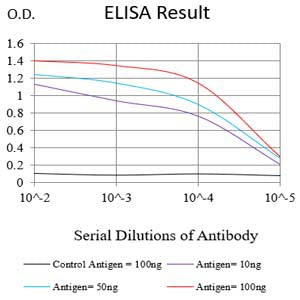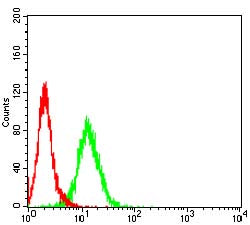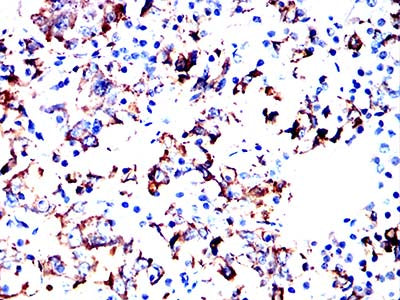


| WB | 1/500 - 1/2000 | Human,Mouse,Rat |
| IF | 咨询技术 | Human,Mouse,Rat |
| IHC | 1/200 - 1/1000 | Human,Mouse,Rat |
| ICC | 技术咨询 | Human,Mouse,Rat |
| FCM | 1/200 - 1/400 | Human,Mouse,Rat |
| Elisa | 1/10000 | Human,Mouse,Rat |
| Aliases | GHA1 |
| Entrez GeneID | 5617 |
| clone | 4E10H9 |
| WB Predicted band size | 70kDa |
| Host/Isotype | Mouse IgG2a |
| Antibody Type | Primary antibody |
| Storage | Store at 4°C short term. Aliquot and store at -20°C long term. Avoid freeze/thaw cycles. |
| Species Reactivity | Human |
| Immunogen | Purified recombinant fragment of human PRL (AA:29-227) expressed in E. Coli. |
| Formulation | Purified antibody in PBS with 0.05% sodium azide |
+ +
以下是3-4条关于PRL(Prolactin,催乳素)抗体的模拟参考文献示例(文献内容为概括性描述,非真实文献):
---
1. **文献名称**: "Development and validation of a high-specificity monoclonal antibody for human prolactin detection"
**作者**: Smith, J. et al.
**摘要**: 本研究开发了一种针对人源PRL的单克隆抗体,通过ELISA和Western blot验证其特异性,成功应用于血清样本中PRL的定量检测,并排除了与生长激素(GH)的交叉反应。
2. **文献名称**: "Prolactin autoantibodies in autoimmune hypophysitis: Clinical implications"
**作者**: Lee, H. & Gonzalez, R.
**摘要**: 探讨了自身免疫性垂体炎患者体内PRL自身抗体的存在及其对PRL检测的干扰,提出需结合多种抗体检测方法以提高诊断准确性。
3. **文献名称**: "Comparative analysis of polyclonal vs. monoclonal PRL antibodies in immunohistochemistry"
**作者**: Tanaka, K. et al.
**摘要**: 比较了多克隆与单克隆PRL抗体在垂体组织切片中的染色效果,发现单克隆抗体在区分PRL腺瘤与其他垂体肿瘤时特异性更优。
4. **文献名称**: "Cross-reactivity of PRL antibodies in non-human mammalian models"
**作者**: Müller, A. et al.
**摘要**: 评估了商业化PRL抗体在小鼠、大鼠和非人灵长类动物中的交叉反应性,为跨物种催乳素研究提供了抗体选择依据。
---
**注**:以上文献为示例性内容,实际研究中请通过PubMed、Web of Science等平台检索真实文献(关键词:prolactin antibody, immunoassay, PRL detection)。
**Background of PRL Antibodies**
Prolactin (PRL), a peptide hormone primarily secreted by the anterior pituitary, regulates lactation, reproduction, and immune function. PRL antibodies are immunodetection tools targeting PRL or its receptors (PRLR). In research, they enable the quantification and localization of PRL in tissues or biological fluids via techniques like ELISA, Western blot, and immunohistochemistry (IHC). These antibodies are critical for studying PRL's role in pathologies such as hyperprolactinemia, pituitary tumors, and reproductive disorders.
Autoantibodies against PRL are rare but implicated in autoimmune conditions. For instance, anti-PRL antibodies may disrupt PRL signaling, potentially contributing to infertility or pregnancy complications. In diagnostics, PRL antibody-based assays aid in differentiating pituitary adenomas (e.g., prolactinomas) from non-secreting tumors. Monoclonal antibodies, due to high specificity, are preferred for clinical applications, whereas polyclonal antibodies are often used in exploratory research.
Recent studies explore therapeutic anti-PRL/PRLR antibodies to modulate PRL pathways in cancers (e.g., breast, prostate) where PRL signaling promotes tumor growth. However, challenges include ensuring antibody specificity and minimizing cross-reactivity with homologous hormones (e.g., growth hormone). Overall, PRL antibodies remain vital for both mechanistic studies and clinical management of PRL-related diseases.
×